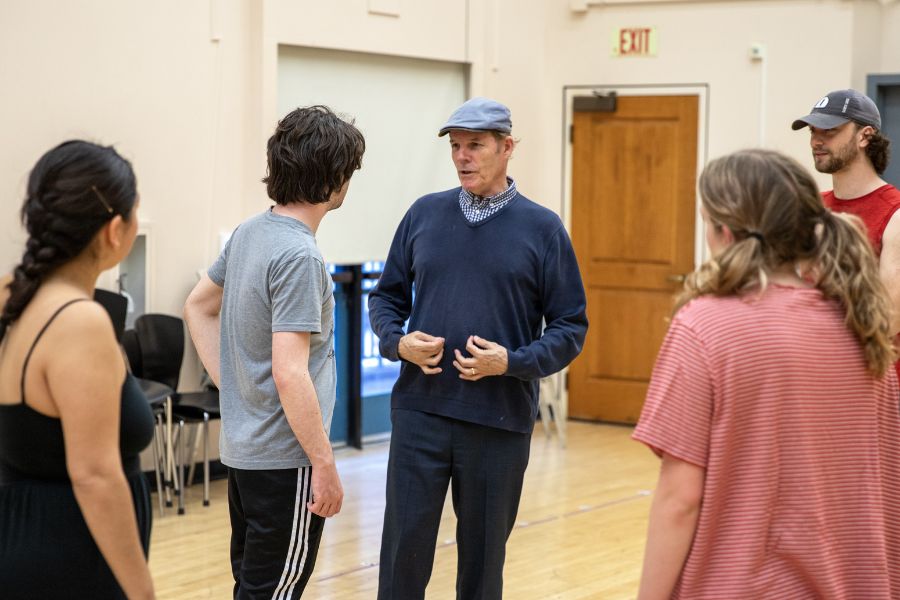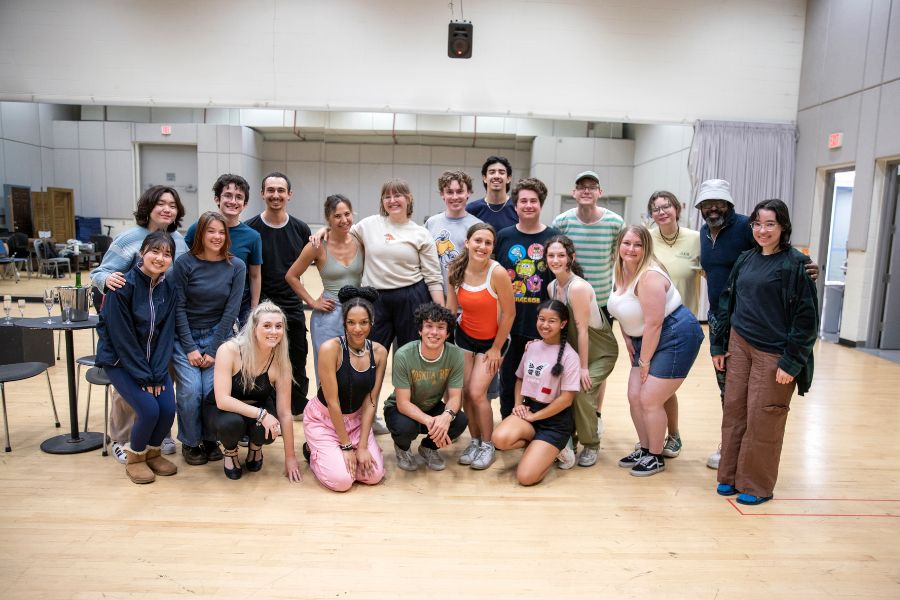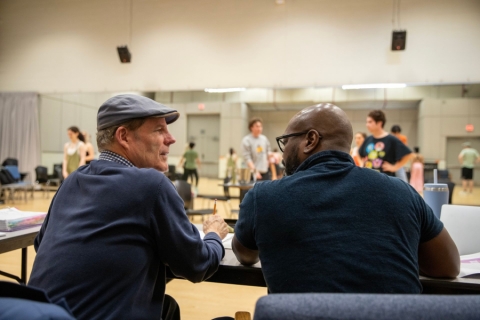Behind the Curtain: The Making of UCI's The Prom
An inside look at the collaboration, creativity and themes of love and acceptance in the drama department’s closing show
Co-directed by Don Hill and Daniel Keeling, The Prom addresses LGBTQ+ themes and societal issues, highlighting the importance of love and acceptance amidst challenges. Through the talents of costume designer Holly Poe Durbin and musical director Trevor Bourland, the production highlights the dynamic interplay of theatre, music, costume design and dance, making The Prom a joyous and timely production to see June 1-8 at the Claire Trevor Theatre.
Professor Don Hill, chair of the Department of Drama, season producer and co-head of the stage management program, reflects on the show's message and sets the stage for the production.
Don Hill, Co-director
Q: How does it feel to end your 20-year tenure at UCI with an impactful production like The Prom?
Don Hill (DH): The Prom marks the tenth show I have directed at UCI. The core themes of the musical are love and acceptance. The storyline revolves around the journey of Emma who is not allowed to bring her girlfriend to the high school prom in the conservative small town where she lives. Emma has been kicked out of her parents’ home for being gay and now lives with her grandmother. I believe the show’s message on inclusivity is perhaps the most important statement I can make and a great note to leave on.
Q: How did you highlight the vibrant energy of the musical, especially considering the challenges of its 2024 Indiana setting?
DH: I don’t think there could be a better show to contribute to the conversation about free speech, diversity, equity and inclusion. When I first had the pleasure of seeing The Prom on Broadway in the spring of 2018, I thought what a great show for the UCI student population. My only concern was would the show still hold up in 2024. The answer is a big yes! Since the spring of 2018, there have been over 100 anti-LGBTQ+ Laws passed in 37 different states, making this piece relevant today.

Image: Don Hill directs the ensemble during a rehearsal
Q: Can you share how The Prom at UCI is working with students to inspire change and foster community through theatre?
Having been born in Iowa and the son of a Presbyterian minister, I was always fascinated by how people would cherry-pick the Bible to find a passage that would support a certain point of view. The Prom has a wonderful musical number entitled Love Thy Neighbor, which is a conversation so desperately needed in our divided country today.
My hope in reaching out to LGBTQ+ high school organizations in Orange County is to invite them to see an affirming show about love and acceptance. The story of The Prom reflects many of the challenges and struggles that queer high school students face today.
Suicide is the third leading cause of death among 15–24 year olds. The Centers for Disease Control and Prevention shares that LGBTQ+ youth are more than four times as likely to attempt suicide than their straight peers. LGBTQ+ young people are not inherently prone to suicide risk because of their sexual orientation or gender identity but rather placed at higher risk because of how they are mistreated and stigmatized in society.
Providing an opportunity for LGBTQ+ high school students to attend The Prom and be invited to dance on stage after the show and celebrate themselves is the hopeful outcome.
Assistant Professor Daniel Keeling, from music theatre, serves as the co-director. Here, he shares insights into balancing the spectacle with the musical's emotional depth.
Daniel Keeling, Co-director
Q: How did you and your co-director balance the spectacle of The Prom with its deeper themes of acceptance and love amidst adversity?
Daniel Keeling (DK): The Prom is a well-written piece of musical comedy, from its book and lyrics to its music composition. Generally, observing and listening to what is written in a great work is more than half the battle. From beginning to end, the sequencing of its scenes balances out all things "spectacle" and the "deeper emotional resonance" in the storytelling.
As directors, we allow the actors to embody their ideas of who their characters are while nudging them to see the well-crafted elements of the show, such as the absurdity, rhythm of the dialogue and accents, while highlighting the gravity of what each scene is asking for from each character.

Image: Some of the cast and artistic team during a rehearsal of The Prom
Q: As co-director, how did you navigate the interdisciplinary collaboration between various departments to ensure a cohesive experience?
DK: I incorporated a metaphor as a guiding star for this production. I found an all-encompassing theme of “transformation” in this opus. I shared with all involved the analogy of a caterpillar metamorphosing into a butterfly as a centralized image for everyone to grasp, work from, and collaborate within. I hope our audiences will see and feel the transformations happening in every aspect of our production.
Q: What do you hope audiences will take away from this production regarding its relevance to contemporary social and political issues?
DK: It's crucial for everyone to deepen their understanding of what it means to thrive and expand themselves. In this post-millennial age, we have witnessed progress and regression. Regression seems to have the advantage because a few are using their power, institutional loopholes and schemes to push their very narrow and myopic, self-interested agendas.
After 14 years of living in Germany, I decided to return to the U.S., moved by the social justice strides and DEI advancements in education. As a Black, gay cis-gendered man who identifies with neurodivergent tendencies, I have experienced rejection and discrimination due to my identity. However, more and more people are living their authentic selves out loud and celebrating others' differences. This development helps people heal from past trauma and the rejection they have received.
This production teaches us that when people come together, things happen — good or bad. I want people to come together and collectively and proactively progress our humanity without losing sight of empathy and compassion, using "love thy neighbor" as a guide.
Professor Holly Poe Durbin, head of the design program and costume design, brings the characters' personalities to life. Durbin's detailed research and creative approach to costume design add a visual richness to the production.
Holly Poe Durbin, Costume Designer
Q: What unique challenges did you face in designing costumes for this production, which includes the most costumes produced for a show at UCI in over 10 years, to fit the characters' personalities and the 2024 Indiana setting?
Holly Poe Durbin (HPD): I did a scary amount of research into the mythical town of Edgewater, Indiana. I found the town of Syracuse, Indiana, which would likely be en route for a non-equity tour of Godspell, which is an important plot point of The Prom. In doing this research I found a TikTok contest for the "Flyest High School in Indiana." I spent hours watching those videos — what a gold mine of characters!
There are 130 costumes in the show, so we may have surpassed the prior record. The most difficult challenge I faced delivering my version of Indiana was that our costume shop staff was not large enough to absorb this number of costumes on top of the other shows that were produced all at the same time: a drama production, a dance concert, an opera and gearing up for New Swan. Everyone on the team is outrageously talented, but even their skills cannot buy more hours in the day. To compensate for this, I tried to be extremely organized, while allowing myself to dream of an artistic response to the show.

Image: Mikayla Thomas-Turner and Will Fixa star as Dee Dee Allen and Barry Glickman in The Prom
Q: How did you approach ensuring that the costumes contributed to the vibrant atmosphere of the musical?
HPD: Musicals call for heightened visual response — after all, in our daily lives people don't burst into song and dance. The biggest challenge is mixing costumes from our stock with new garments. Many of our stock items were created for serious dramas, so it is a real challenge to evolve garments that last played in realistic shows or Shakespeare into garments suitable for The Prom.
Q: Can you share any specific inspirations or design elements you incorporated into the costumes to highlight the characters' journey of embracing their identities?
HPD: I chose to highlight the emotional and intellectual stagnation at the heart of rejecting people because they are not identical to you. My visual vocabulary for that idea was to costume the town of Edgewater as an homage to the 1950s, when their mindset stagnated. I also controlled their color palette in browns and greens as they lead lives robbed of vibrance that result from unquestioned conformity. At the end of the show, the color palette shifts dramatically into the colors of the Pride rainbow.
There is also a wonderful surprise costume that delivers the show's message and foreshadows the ending, but I won't reveal what it is! You will have to see it to believe it.
Musical director and M.F.A. candidate Trevor Bourland explains how the show's diverse musical styles and cohesive performances enhance its impact. The Prom serves as Bourland's M.F.A. thesis.
Trevor Bourland, Musical Director
Q: As the music director for The Prom, how did you approach interpreting the score to reflect the show’s themes of love, acceptance and self-discovery?
Trevor Bourland (TB): As music director, much of my role is more prescriptive than creative; ensuring the actors and instrumentalists perform the music as it is presented on the page and maintaining it throughout the process, creating and following a click track. However, the more creative and interpretive aspects come in the rehearsal space when I’m collaborating with the cast and other creative team members.
Co-director Daniel Keeling has, on more than one occasion, referred to the idea of metamorphosis, especially regarding caterpillars going through chrysalis to become butterflies. Through this lens, I have been able to trace individual characters’ growth throughout the show: Broadway diva Dee Dee Allen’s material is evocative of shows like Evita and Company, juxtaposed against her romantic counterpart Tom Hawkins whose major song is evocative of the mid-century Golden Age musicals, highlighting their differences. Later in the show, they meet not somewhere in the middle but embracing modernity in the pop-rock finale, It’s Time to Dance. In working with the actors portraying these two roles, I’ve encouraged them to lean into the referential nature of the score and evoke the likes of Patti LuPone, Barbra Streisand and Liza Minelli in the case of Allen, or for Hawkins, Robert Goulet and Rex Harrison.

Image: Trevor Bourland at the piano during a rehearsal
Q: The Prom incorporates a diverse range of musical styles, from upbeat ensemble numbers to poignant ballads. How did you work to ensure a cohesive and harmonious performance across these different musical genres?
TB: What’s fun about this show is how referential it is to iconic musicals and pop culture moments like The Acceptance Song, which is a sendup of We Are the World. This does pose a challenge in terms of overall cohesion, especially because the varied styles are meant to highlight the ideological disconnect between the rural townspeople and the big city stars. The composer, Matthew Sklar, wove motifs through the underscoring music which helps weave a cohesive score together.
Q: How did you collaborate with the director, choreographer and other creative team members to ensure the music seamlessly integrated with the overall vision of the production?
TB: First, I would be remiss not to mention the members of my music team: associate music director Sain Leyva and music assistant Nanami Yamakawa, as well as my advisor Zach Dietz. Having a team of dedicated people supporting me in keeping track of all the moving parts involved in a show like this has been immeasurably helpful. Since music directors are often required to play the piano throughout the show while also conducting, it has been great to have someone writing down notes during rehearsals while my hands are preoccupied.
In terms of collaborating with the rest of the creative team, there has been a great deal of discussion over how dialogue fits over underscoring, especially mid-song when there is either a finite amount of music to fit lines over or a vamp that the band repeats indefinitely until cued to go on. The score is so well written and incredibly specific, so we all have been hyper-aware of how the music shifts or indicates some sort of physical accent.
The Prom will be presented from June 1-8 at the Claire Trevor Theatre. For more information and tickets, visit arts.uci.edu/event/prom.
Performances and Ticket Information
Evenings: June 1, 6, 7, 8 at 8 p.m.
Matinees: June 2*, 8 at 2 p.m.
Evening: June 5 at 7:30 p.m.
*Please join us after the Sunday, June 2 matinee for a TalkBack with cast & crew.
Tickets
General Admission: $25/ Senior Age 62+: $22/ UCI Faculty, Alumni, Staff, Emeriti and Retirees: $22/ Arts Packages (3+ events): $21/ Groups 10+: $20/ Students & Youth Ages 17/Below: $10

